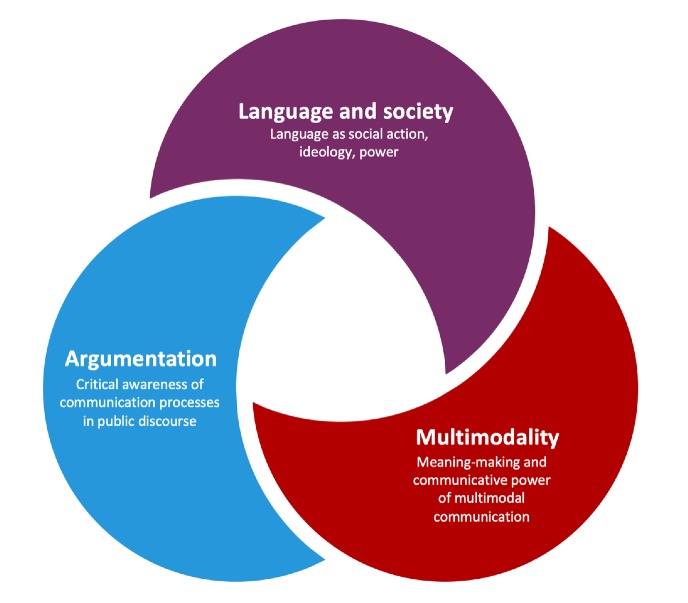Responsibility, Language, and Communication (RESPONSUS - research group)
The Responsibility, Language, and Communication group (Responsus) is committed to fostering sustainable futures through the study of language and communication.
We recognize the power of language and communication to shape our understanding of the world and our relationships with each other and the environment.
As a group, we take our 'responsus' - our responsibility and our commitment to response - seriously: we are committed to responding to practical needs in research and curriculum development by working with colleagues to understand and incorporate the role of language and communication in their work.

The role of language
We seek to understand the role of language and communication in the creation of more equitable and environmentally responsible societies, and we are dedicated to helping other disciplines, such as economics, entrepreneurship, marketing, environmental sciences, and engineering (to name a few), to develop a deeper understanding of the role and power of language and communication.
Drawing on approaches from (applied) linguistics, business and professional communication, organization and multimodal discourse studies, as well as rhetoric and argumentation, we aim to promote the use of language and communication as tools for fostering communication skills, critical thinking, social responsibility.
We work in three overlapping strands, see the image.
Group members of Responsibility, language and communication:
Erika is passionate about raising awareness of the importance and power of language especially its role in pressing societal issues. She is the co-host of the Words and Actions podcast and currently the vice president of the Association for Business Communication.
Joanna is passionate about exploring the power and influence of language in social relations, especially, but not only, with regard to gender and sexuality. She is a member of the Language Diversity working group in CLCG and one of the founding members of the Gender, Diversity and Inequalities working group in Agricola.
Matt Drury
As an ecologist turned applied linguist, Matt is keen on raising awareness of the role that language can play in exacerbating environmental problems. He uses this knowledge to investigate forms of communication which challenge the status quo and inspire meaningful behavioural change.
Femke's involvement stems from her firm belief that it is through language that we shape and perceive the world. In her teaching, she encourages students to recognise and expose patterns of language use that contribute to ecological destruction, and to seek, preserve and restore forms of expression that inspire people to protect nature.
Maria is an assistant professor in the group Minorities & Multilingualism and teaches classes related to minority languages' sociolinguistics, language contact and language planning and policy, in the MA Multilingualism and BA Minorities & Multilingualism.She interested in the support language scholars can give towards sustainable multilingualism in highly diverse societies, in coordination with residents, policy makers, administrators and other managers.
As a communications advisor, Francine is actively working on raising awareness and getting decision-makers on board for a greener and more sustainable University. She is motivated to contribute to this with the formation of policy and the development of new communication strategies and campaigns. Francine strongly believes that transparency is key in all communication about sustainability.
Jelte studies political rhetoric and is fascinated by the ability of language to shape our perceptions of ourselves and the world we live in. He studies how speakers, from U.S. presidents to climate activists, use rhetoric to create identities and speak for those who do not (yet) have a voice, including future generations.
Believes it is crucial for a just and sustainable society that people are aware of the influential force of language, especially in decision-making processes, and possess the tools to recognize and critically assess explicit and implicit argumentative strategies.
Dimitris Serafis is Assistant Professor at the University of Groningen's Faculty of Arts. He studies the ways in which racism and hatred are justified by public argumentation in media and politics in times of crises. He is the author of Authoritarianism on the front page: multimodal discourse and argumentation in times of multiple crises in Greece (2023, John Benjamins).
Strongly believes in the multimodal nature of language and communication and therefore feels responsible for raising awareness of the importance of all expressive forms in our texts and speeches: static and moving
Roel studies socio-technical innovation and sustainability transitions. More specifically, he focusses on language-use in real-life and real-time social interactions in public participation trajectories. His research aims to contribute to facilitating inclusive and constructive dialogues about a future sustainable society.
A literary critic, Massih is fascinated by the cultural, political, economic, and material aspects of sustainable and pro-environmental behavior at individual and collective levels. His foray into these complex and intricate dynamics primarily concern the potential environmental impacts of humor and satire in cultural productions.
Contact
To get in touch and to follow our activities, join RESPONSUS on LinkedIn
| Last modified: | 24 April 2024 10.23 a.m. |

